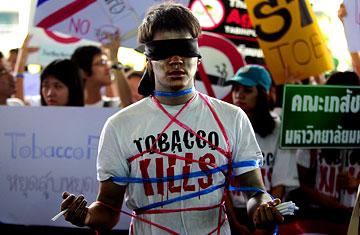
A Thai student takes part in a protest against Tabinfo in Bangkok on Nov. 11, 2009
Thailand may have a reputation for indulging visitors in their various vices, but smoking is no longer one of them. On Tuesday, more than 600 fired-up protesters invaded a convention center in Bangkok in an attempt to smoke out representatives of the global tobacco industry, who were holding a conference in a country with some of the strictest tobacco controls in Asia.
"They've come here because they want to target women and children in Asia with products that kill," says Bangorn Ritthiphakdee, director of the Southeast Asia Tobacco Control Alliance, a civil-society group, referring to attendees of Tabinfo 2009, a three-day conference organized by Tobacco Reporter, a U.S.-based magazine. "Their presence is a nightmare. We came to tell them they are not welcome here."
The tobacco industry sees Asia as its most promising market, says Bangorn. Though Thailand has strict controls on smoking in public places and bans advertising of tobacco products, more than 14 million of its 65 million people are smokers. In Southeast Asia, 125 million — or 31% of adults — smoke, and China alone has some 350 million smokers. The alliance claims that 2.4 million people in Asia die each year from tobacco-related causes, the equivalent of 6,575 people a day.
Billed as "the biggest tobacco exhibition in Asia," Tabinfo 2009 has been years in the making. Nonetheless, the meeting apparently caught Thailand's government by surprise. Prime Minister Abhisit Vejjajiva, who has said he was unaware of the conference until two weeks before it started, ordered government and tourism agencies not to do anything to promote or support it after activists presented him with a petition opposing the conference that contained more than 82,000 signatures. Thailand's state-run tobacco monopoly withdrew its exhibitions and sponsorship of a buffet breakfast for industry representatives just days before the conference began.
Most countries in Asia have signed on to the World Health Organization's Framework Convention on Tobacco Control (FCTC), which calls for price and tax measures to discourage demand for tobacco, along with measures to regulate or restrict tobacco advertising, sales to minors, packaging and product content. "The tobacco industry says it supports [the FCTC], but in fact they are working to undermine the framework in countries across the region," Bangorn says. The conference agenda, she says, includes presentations like "Operating in a World of Bans" and a regulatory workshop that "invites participants to wipe the regulatory slate clean and start afresh." Other topic descriptions spoke of "state-sponsored behavior modification" and "aggressive legislation." Particularly galling to the protesters was the seminar entitled "Harm and Risk Reduction: Should It Be an Integral Part of Global Health Policy?"
After a raucous but peaceful protest that lasted an hour, security guards at the Impact Convention Center forced the demonstrators to leave. Conference organizers refused to meet with the protesters and locked the meeting-room doors to members of the media without making a statement, except to say the conference was private. Churit Tengtrisorn of Thailand's Ministry of Public Health said that the ministry opposed Tabinfo 2009 and the tobacco industry in general. "The tobacco industry has been pushed out of the developed world, and now it is trying to exploit the developing world. We are certain that it will try every trick in the bag to penetrate the Asian market," says Hatai Chitanondh, a public-health activist. Says Bangorn: "It's just killing people for profits."
